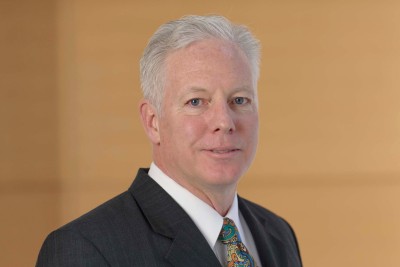
Michael A. Foley, a renowned chemist and entrepreneur, has been elected to lead the Tri-Institutional Therapeutics Discovery Institute, Inc. (Tri-I TDI) — an innovative partnership that Memorial Sloan Kettering recently formed with its neighboring research institutions, The Rockefeller University and Weill Cornell Medical College, to speed drug discovery.
Dr. Foley, who brings 25 years of industry and academic experience to Tri-I TDI, is the scientific co-founder of four companies and one academic institute and has placed 12 drugs into clinical development. He was most recently the Director of the Chemical Biology Platform at the Broad Institute of MIT and Harvard. Previously, he worked at two major pharmaceutical companies, Bristol-Myers Squibb and GlaxoSmithKline.
“We are fortunate to have recruited Dr. Foley to spearhead the Tri-I TDI,” says Memorial Sloan Kettering President and CEO Craig B. Thompson. “His scientific expertise and proven ability to shape drug discovery initiatives will be an asset to the Tri-I TDI’s development.”
A New Model for Academic Drug Discovery
Launched in October, the Tri-I TDI was designed to accelerate the development of biomedical research findings into innovative treatments for people with various diseases, including cancer. Under Dr. Foley’s leadership, it will support investigators at the three member institutions during the early stages of drug discovery — a phase during which many promising ideas currently stall due to the lack of research funding.
The institute will leverage institutional centers and facilities on the three campuses, including the Experimental Therapeutics Center and Technology Development Fund at Memorial Sloan Kettering, the Abby and Howard P. Milstein Program in Medicinal Chemistry at Weill Cornell Medical College, and the High-Throughput Screening Resource Center at The Rockefeller University. Projects that will be tackled could range from addressing the developing world’s most serious and deadly diseases — from Alzheimer’s disease, cancer, HIV, heart disease, and obesity, to tuberculosis and malaria — and neglected or “orphan” diseases that afflict small numbers of people.
Initially, the institute will focus on the development of small-molecule therapeutic agents and molecular probes. Over time, its work will expand to include biologic agents such as monoclonal antibodies and molecular imaging agents.
Building Links with Industry
Tri-I TDI has engaged the Takeda Pharmaceutical Company, Ltd., a global biotech company with a strong record of bringing new medicines to the market, as a first collaborator to help develop small-molecule drugs. Marc Tessier-Lavigne, President of The Rockefeller University, notes that building links between academia and industry is an important mission of Tri-I TDI.
“With his extensive experience in both environments, Dr. Foley is an ideal choice to serve as the institute’s founding director,” Dr. Tessier-Lavigne says. Laurie H. Glimcher, the Stephen and Suzanne Weiss Dean of Weill Cornell Medical College, adds that Dr. Foley’s track record of moving early-stage compounds through drug development is a “perfect match for the Tri-I TDI’s ambitions of accelerating bench discoveries into effective therapies for patients.”
“I am thrilled to be part of this pioneering approach to drug discovery,” Dr. Foley says of his appointment as Sanders Director of Tri-I TDI and Director of its Sanders Innovation and Education Initiative. His titles recognize a $15 million gift from Lewis and Ali Sanders that helped establish the institute.
“The structure of the Tri-I TDI has enormous potential to not only bridge the gap between academia and the pharmaceutical industry,” he adds, “but also to take burgeoning ideas and rapidly adapt them into real, tangible treatments that can benefit patients now.”


